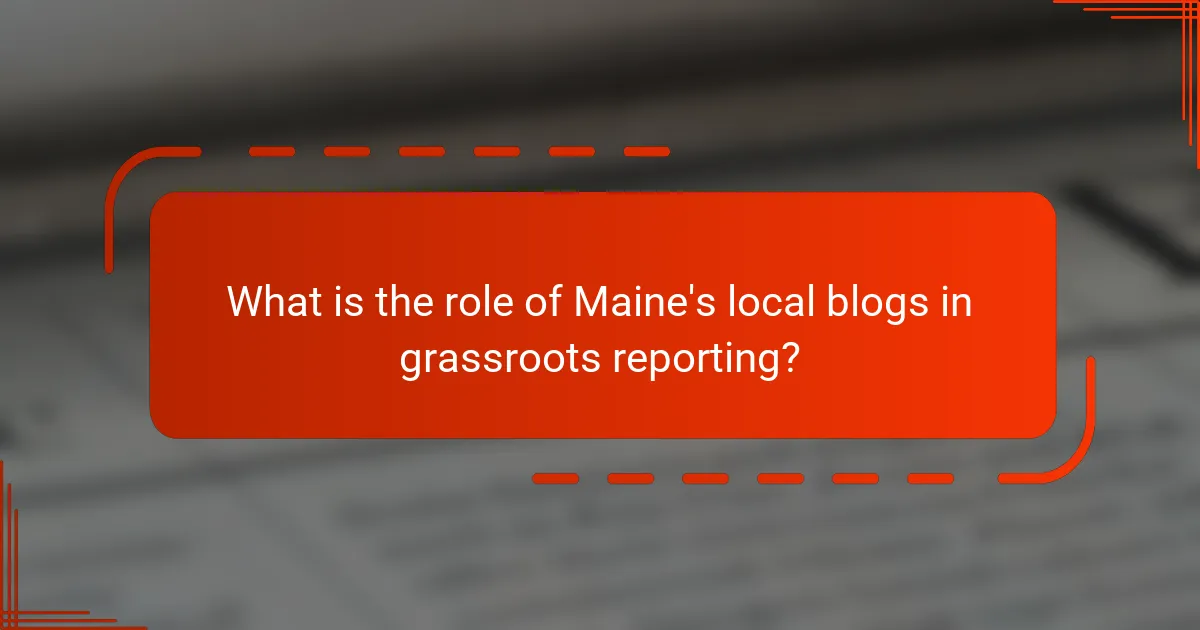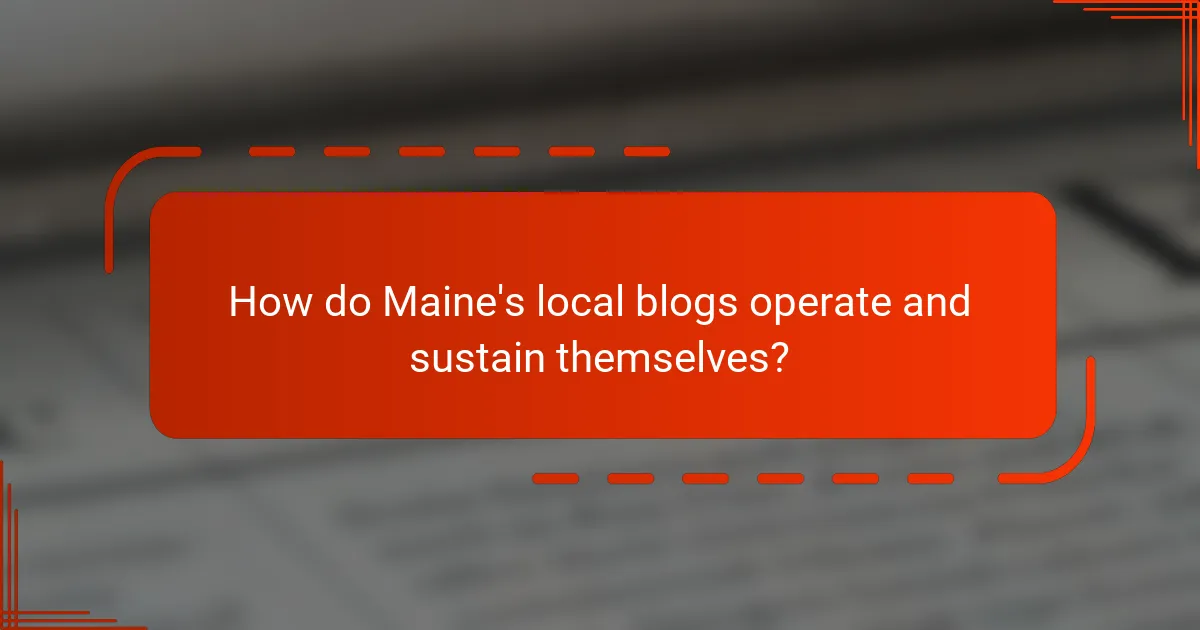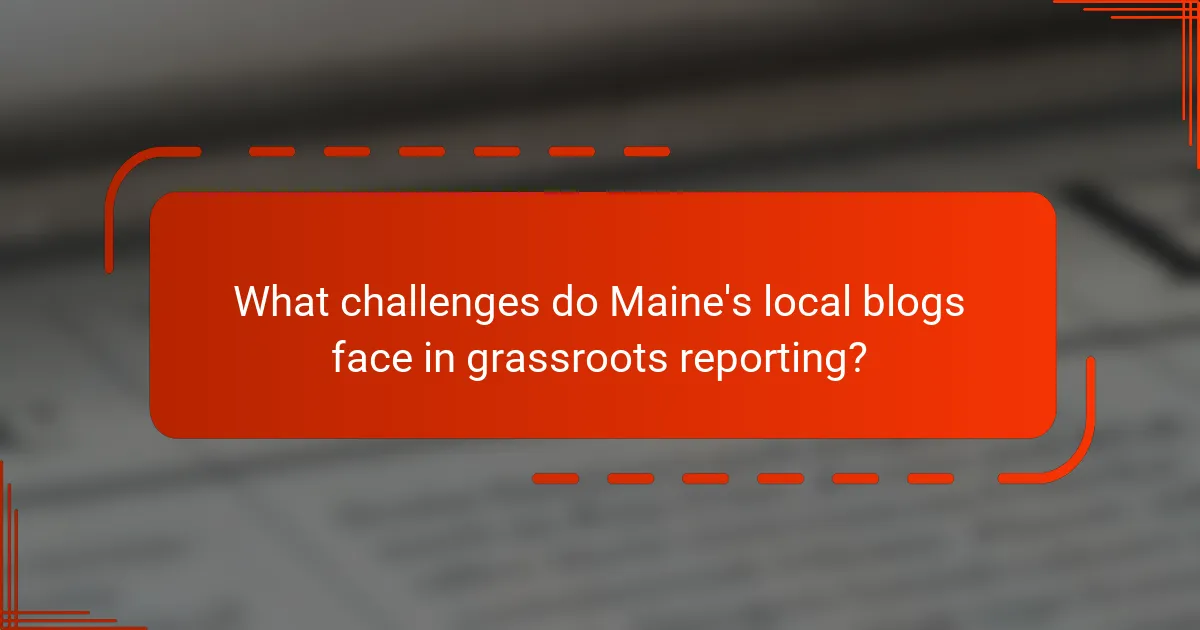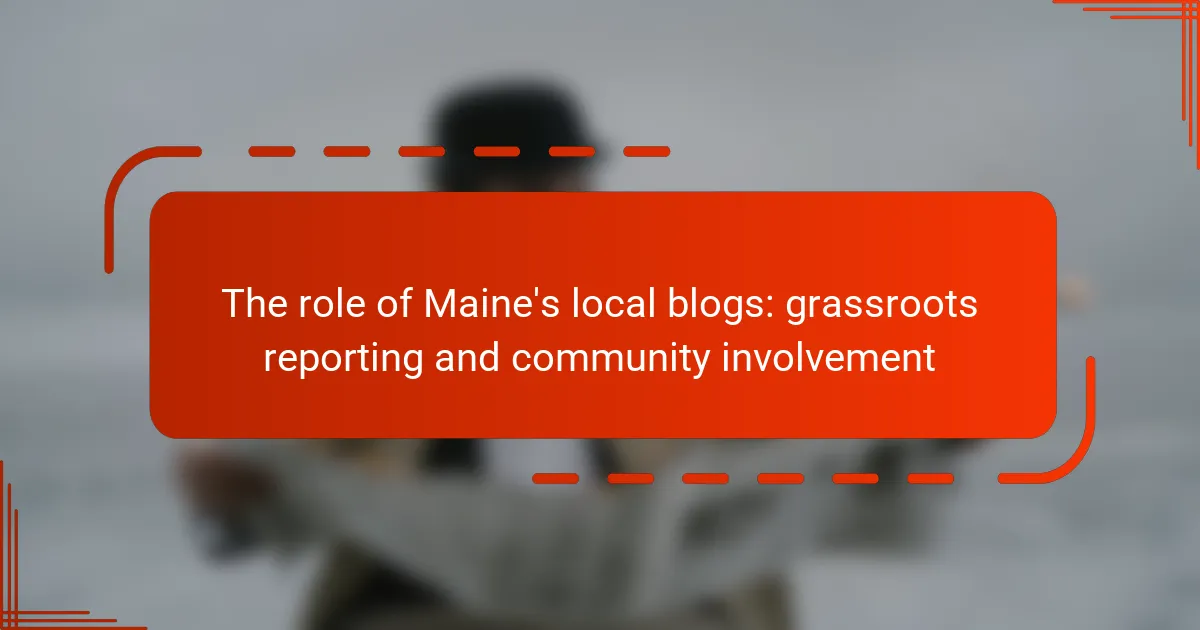Maine’s local blogs serve as vital platforms for grassroots reporting, amplifying community voices and addressing local issues often ignored by mainstream media. These blogs empower residents to engage in discussions about governance and social topics while providing investigative reporting that holds authorities accountable. Operating mainly through community engagement and volunteer contributions, they face challenges such as limited funding and competition with larger outlets, which can impact content quality and audience retention. Despite these hurdles, Maine’s local blogs enhance civic engagement and transparency, fostering a strong connection within the community.

What is the role of Maine’s local blogs in grassroots reporting?
Maine’s local blogs play a crucial role in grassroots reporting by providing a platform for community voices. They cover local issues often overlooked by mainstream media. These blogs empower residents to share their experiences and insights. They foster dialogue on important topics, such as local governance and social issues. Many local blogs focus on investigative reporting that holds authorities accountable. They also serve as a resource for local events and initiatives. By highlighting community stories, they strengthen civic engagement. This grassroots approach enhances transparency and encourages public participation in local affairs.
How do local blogs contribute to community engagement in Maine?
Local blogs foster community engagement in Maine by providing a platform for local voices. They highlight local issues, events, and initiatives that matter to residents. These blogs encourage dialogue among community members, creating a sense of belonging. They often feature guest posts from locals, amplifying diverse perspectives. Local blogs also share information about town meetings and community gatherings. This increases participation in civic activities. Research indicates that communities with active local blogs report higher levels of civic engagement. For example, a study by the Pew Research Center found that local news sources boost community involvement.
What types of stories do Maine’s local blogs typically cover?
Maine’s local blogs typically cover community news, events, and local issues. They often highlight stories about local businesses and cultural happenings. Environmental concerns and outdoor activities are also common topics. Additionally, personal narratives and local history are frequently featured. These blogs serve as platforms for grassroots reporting. They engage community members in discussions about relevant topics. Local blogs often reflect the unique character of Maine’s diverse communities. This focus on local content fosters community involvement and awareness.
How do local blogs amplify underrepresented voices in the community?
Local blogs amplify underrepresented voices in the community by providing a platform for diverse perspectives. They often focus on issues that mainstream media neglects. This includes topics relevant to marginalized groups, such as social justice, local activism, and cultural events. Local blogs encourage community members to share their stories and experiences. They create a sense of belonging and representation for these voices. Research indicates that community-driven content fosters engagement and dialogue. For example, blogs in Maine highlight local initiatives and grassroots movements. This empowers individuals to participate in civic discussions and advocacy.
Why are local blogs important for grassroots movements in Maine?
Local blogs are crucial for grassroots movements in Maine because they provide a platform for community voices. They amplify local issues that may be overlooked by mainstream media. This fosters engagement and mobilization among residents. Local blogs often feature stories that reflect the unique challenges of Maine communities. They serve as a space for organizing events and sharing resources. Additionally, blogs can connect like-minded individuals, building networks of support. The accessibility of blogs allows for diverse perspectives to be heard. Research shows that communities with active local blogs experience higher civic participation rates.
What impact do local blogs have on local elections and civic participation?
Local blogs significantly influence local elections and civic participation. They provide a platform for grassroots reporting, allowing community voices to be heard. This encourages dialogue among residents about local issues. Blogs often cover topics that mainstream media might overlook, fostering greater awareness. Increased awareness leads to higher voter engagement. According to a study by the Pew Research Center, local news outlets, including blogs, enhance civic knowledge. This knowledge translates into informed voting decisions. Ultimately, local blogs serve as vital tools for enhancing democracy at the community level.
How do Maine’s local blogs foster community solidarity and action?
Maine’s local blogs foster community solidarity and action by providing a platform for grassroots reporting. These blogs share stories that highlight local issues and initiatives. They encourage citizen engagement through discussions and comments. Local bloggers often collaborate with community organizations to promote events and causes. This collaboration amplifies community voices and fosters a sense of belonging. For example, blogs may cover local fundraisers or volunteer opportunities. By connecting residents with resources, these blogs drive collective action. Additionally, they create a space for diverse perspectives, enhancing community dialogue.

How do Maine’s local blogs operate and sustain themselves?
Maine’s local blogs operate primarily through community engagement and volunteer contributions. They often rely on local writers who share their insights and experiences. Many blogs are funded by donations from readers and local businesses. Some utilize advertising revenue from local businesses seeking to reach community members. Others may apply for grants aimed at supporting local journalism. The blogs often cover hyper-local topics that larger media outlets overlook. This focus fosters a strong connection with the community. Evidence shows that community-supported models can enhance sustainability. For instance, local blogs that engage in fundraising efforts often see increased reader loyalty and support.
What are the primary funding sources for local blogs in Maine?
Local blogs in Maine primarily fund themselves through advertising revenue, community donations, and sponsorships. Advertising revenue comes from local businesses seeking to reach community audiences. Community donations often support blogs through platforms like Patreon or direct contributions. Sponsorships involve partnerships with local organizations or events that align with the blog’s mission. According to a survey by the Maine Press Association, 60% of local blogs reported advertising as their main funding source. Additionally, 25% of blogs rely on community support to sustain operations.
How do advertising and sponsorships influence content on local blogs?
Advertising and sponsorships significantly influence content on local blogs. They often dictate the topics that bloggers choose to cover. Sponsored content may prioritize the interests of advertisers over community issues. This can lead to a shift in focus from grassroots reporting to commercial interests. Local bloggers may feel pressured to create content that aligns with sponsor expectations. Research shows that 60% of bloggers report altering their content due to sponsorships. This influence can affect the authenticity of the information presented. Ultimately, the balance between community involvement and commercial interests becomes crucial for local blogs.
What role do community donations play in the sustainability of local blogs?
Community donations are vital for the sustainability of local blogs. They provide essential financial support that allows bloggers to cover operational costs. This funding helps maintain quality content and encourages independent journalism. Local blogs often rely on community engagement for their survival. Donations foster a sense of ownership among readers. This connection can lead to increased readership and loyalty. According to a study by the Pew Research Center, community-supported journalism fosters trust and accountability. Thus, community donations play a crucial role in enabling local blogs to thrive.
How do local blogs engage with their audience in Maine?
Local blogs in Maine engage their audience through interactive content and community-focused topics. They often feature local events, news, and personal stories that resonate with residents. Many blogs encourage reader participation via comments and social media sharing. This interaction fosters a sense of community among readers. Additionally, local blogs often conduct polls or surveys to gather audience opinions. They may also host community forums to discuss relevant issues. This approach helps build trust and loyalty among readers. Overall, local blogs serve as a platform for grassroots reporting and community involvement, connecting residents with local narratives and each other.
What strategies do local blogs use to build a loyal readership?
Local blogs build a loyal readership through community engagement, consistent content, and personalized interactions. They often highlight local events, news, and issues that resonate with their audience. By fostering a sense of belonging, these blogs encourage readers to participate in discussions. Regular updates keep the audience informed and coming back for more. Many local blogs also utilize social media to share content and interact directly with readers. This two-way communication strengthens relationships and builds trust. Additionally, offering exclusive content or insights can enhance reader loyalty. Collaborations with local businesses further embed blogs within the community.
How do social media platforms enhance the reach of local blogs?
Social media platforms enhance the reach of local blogs by providing a broader audience and facilitating engagement. They allow bloggers to share content instantly with followers. This immediate sharing increases visibility beyond local readership. Platforms like Facebook and Twitter enable targeted advertising to specific demographics. Local blogs can utilize hashtags to connect with community discussions. Engaging visuals and multimedia on social media attract more attention. According to a Pew Research study, 69% of adults in the U.S. use social media, amplifying potential blog readership. This increased interaction fosters community involvement and grassroots reporting.

What challenges do Maine’s local blogs face in grassroots reporting?
Maine’s local blogs face several challenges in grassroots reporting. Limited funding restricts their ability to hire professional journalists. This leads to reliance on volunteer contributions, which can affect content quality and consistency. Additionally, competition with larger media outlets makes it difficult for local blogs to gain visibility. Many local blogs struggle with audience engagement and retaining readership. Technical skills and resources for effective online presence are often lacking. Furthermore, the rural nature of Maine can hinder access to information and sources. These factors collectively impact the effectiveness of grassroots reporting in local blogs.
How do local blogs combat misinformation in their reporting?
Local blogs combat misinformation by prioritizing fact-checking and community engagement. They often verify claims through reliable sources before publishing. Many local blogs encourage readers to submit tips and corrections. This creates a collaborative environment that fosters accuracy. They also provide context to news stories, helping readers understand complex issues. By focusing on local events, they can address misinformation specific to their communities. Additionally, local blogs often highlight official statements from local authorities. This reinforces their credibility and combats false narratives. Overall, their grassroots approach enhances trust and accountability in reporting.
What are the legal and ethical considerations for local bloggers?
Local bloggers must consider legal and ethical issues to maintain credibility and avoid liability. Legal considerations include copyright laws, which protect original content. Bloggers should ensure they have permission to use images or text from other sources. Defamation laws are also crucial; bloggers must avoid making false statements about individuals or organizations.
Ethically, local bloggers should strive for accuracy and fairness in reporting. They should disclose any conflicts of interest, especially when covering local businesses or events. Transparency builds trust within the community.
Additionally, local bloggers should respect privacy rights by obtaining consent when sharing personal information. Following these guidelines helps bloggers navigate the complex landscape of legal and ethical responsibilities.
How do local blogs address issues of credibility and trustworthiness?
Local blogs address issues of credibility and trustworthiness by emphasizing transparency in their reporting practices. They often disclose their sources and provide context for the information presented. Many local blogs engage with their community through comments and feedback, fostering a dialogue that enhances trust. They may also include author bios to establish credibility through the expertise of their contributors. Additionally, some blogs adhere to ethical journalism standards, which reinforces their commitment to accurate and fair reporting. This approach helps build a loyal readership that values reliable information.
What future trends can be expected for local blogs in Maine?
Local blogs in Maine are expected to become more community-focused and interactive. Increased engagement with readers will be a significant trend. Local bloggers will likely prioritize grassroots reporting on community issues. This shift aligns with the growing demand for authentic local news. Additionally, collaboration between local blogs and traditional media may increase. The use of social media to amplify blog content will also rise. Data shows that local audiences prefer hyper-local content, enhancing blog relevance. These trends indicate a vibrant future for local blogging in Maine.
How might technology change the landscape of local blogging in Maine?
Technology will significantly enhance local blogging in Maine by increasing accessibility and engagement. Improved internet connectivity allows more residents to share their stories. Mobile devices enable on-the-go content creation and consumption. Social media platforms facilitate wider audience reach and real-time interaction. Advanced analytics tools help bloggers understand their audience better. This data-driven approach fosters tailored content that resonates with local readers. Furthermore, multimedia capabilities allow for richer storytelling through videos and podcasts. These technological advancements collectively empower local voices and strengthen community ties in Maine.
What role will local blogs play in shaping community narratives moving forward?
Local blogs will play a crucial role in shaping community narratives moving forward. They provide a platform for grassroots reporting and amplify local voices. These blogs often cover stories that mainstream media may overlook. They foster community engagement by encouraging dialogue among residents. Local blogs also serve as a resource for information on local events and issues. This helps build a sense of community identity and solidarity. Studies show that community-driven content can increase civic participation. As digital platforms evolve, local blogs will continue to be vital in reflecting community values and concerns.
What best practices can local bloggers in Maine adopt for effective grassroots reporting?
Local bloggers in Maine can adopt several best practices for effective grassroots reporting. They should prioritize community engagement by actively participating in local events and discussions. This involvement builds trust and a deeper understanding of community issues.
Utilizing social media platforms can enhance outreach and facilitate real-time interactions with readers. Local bloggers should also focus on accurate and timely reporting. Fact-checking and citing credible sources strengthen the reliability of their content.
Establishing connections with local organizations can provide valuable insights and resources. Collaborating with other bloggers fosters a network of shared knowledge and support.
Finally, maintaining transparency about their reporting processes encourages reader trust. By following these best practices, local bloggers in Maine can effectively contribute to grassroots reporting.
Maine’s local blogs serve as a vital entity in grassroots reporting, empowering community voices and fostering civic engagement. They cover local issues often overlooked by mainstream media, emphasizing investigative reporting and amplifying underrepresented perspectives. The article explores the role of local blogs in enhancing community involvement, their operational sustainability through funding sources, and the challenges they face in maintaining credibility and trustworthiness. Additionally, it discusses future trends in local blogging and best practices for effective grassroots reporting, highlighting the importance of these platforms in shaping community narratives.
